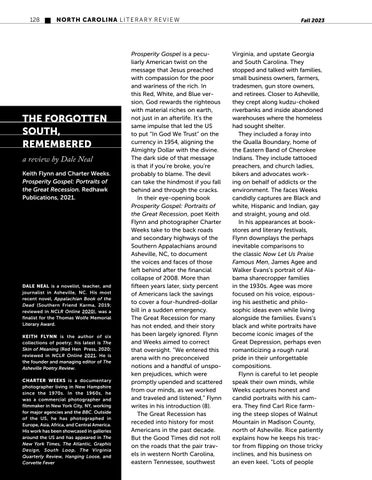128
NORTH CAROLINA L I T E R A R Y R E V I E W
THE FORGOTTEN SOUTH, REMEMBERED a review by Dale Neal Keith Flynn and Charter Weeks. Prosperity Gospel: Portraits of the Great Recession. Redhawk Publications, 2021.
DALE NEAL is a novelist, teacher, and journalist in Asheville, NC. His most recent novel, Appalachian Book of the Dead (Southern Friend Karma, 2019; reviewed in NCLR Online 2020), was a finalist for the Thomas Wolfe Memorial Literary Award. KEITH FLYNN is the author of six collections of poetry; his latest is The Skin of Meaning (Red Hen Press, 2020; reviewed in NCLR Online 2021. He is the founder and managing editor of The Asheville Poetry Review. CHARTER WEEKS is a documentary photographer living in New Hampshire since the 1970s. In the 1960s, he was a commercial photographer and filmmaker in New York City, NY, working for major agencies and the BBC. Outside of the US, he has photographed in Europe, Asia, Africa, and Central America. His work has been showcased in galleries around the US and has appeared in The New York Times, The Atlantic, Graphis Design, South Loop, The Virginia Quarterly Review, Hanging Loose, and Corvette Fever
Prosperity Gospel is a peculiarly American twist on the message that Jesus preached with compassion for the poor and wariness of the rich. In this Red, White, and Blue version, God rewards the righteous with material riches on earth, not just in an afterlife. It’s the same impulse that led the US to put “In God We Trust” on the currency in 1954, aligning the Almighty Dollar with the divine. The dark side of that message is that if you’re broke, you’re probably to blame. The devil can take the hindmost if you fall behind and through the cracks. In their eye-opening book Prosperity Gospel: Portraits of the Great Recession, poet Keith Flynn and photographer Charter Weeks take to the back roads and secondary highways of the Southern Appalachians around Asheville, NC, to document the voices and faces of those left behind after the financial collapse of 2008. More than fifteen years later, sixty percent of Americans lack the savings to cover a four-hundred-dollar bill in a sudden emergency. The Great Recession for many has not ended, and their story has been largely ignored. Flynn and Weeks aimed to correct that oversight. “We entered this arena with no preconceived notions and a handful of unspoken prejudices, which were promptly upended and scattered from our minds, as we worked and traveled and listened,” Flynn writes in his introduction (8). The Great Recession has receded into history for most Americans in the past decade. But the Good Times did not roll on the roads that the pair travels in western North Carolina, eastern Tennessee, southwest
Fall 2023
Virginia, and upstate Georgia and South Carolina. They stopped and talked with families, small business owners, farmers, tradesmen, gun store owners, and retirees. Closer to Asheville, they crept along kudzu-choked riverbanks and inside abandoned warehouses where the homeless had sought shelter. They included a foray into the Qualla Boundary, home of the Eastern Band of Cherokee Indians. They include tattooed preachers, and church ladies, bikers and advocates working on behalf of addicts or the environment. The faces Weeks candidly captures are Black and white, Hispanic and Indian, gay and straight, young and old. In his appearances at bookstores and literary festivals, Flynn downplays the perhaps inevitable comparisons to the classic Now Let Us Praise Famous Men, James Agee and Walker Evans’s portrait of Alabama sharecropper families in the 1930s. Agee was more focused on his voice, espousing his aesthetic and philosophic ideas even while living alongside the families. Evans’s black and white portraits have become iconic images of the Great Depression, perhaps even romanticizing a rough rural pride in their unforgettable compositions. Flynn is careful to let people speak their own minds, while Weeks captures honest and candid portraits with his camera. They find Carl Rice farming the steep slopes of Walnut Mountain in Madison County, north of Asheville. Rice patiently explains how he keeps his tractor from flipping on those tricky inclines, and his business on an even keel. “Lots of people
